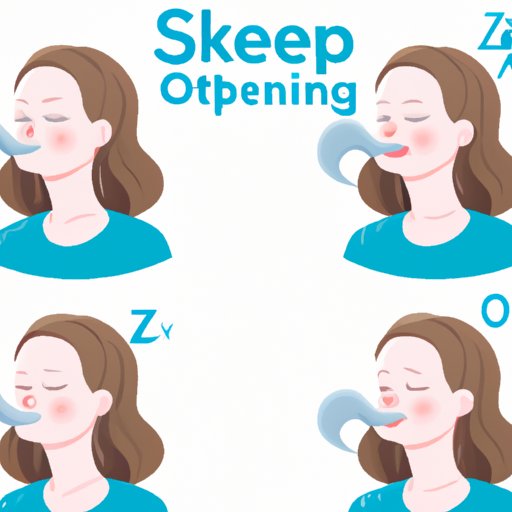
How to Stop Sleeping with Mouth Open: Tips, Exercises, and Mouthpieces
Do you wake up with a dry mouth and throat every morning? Do you snore loudly or suffer from sleep apnea? These could be signs that you are sleeping with your mouth open. Mouth breathing during sleep can have a negative impact on your sleep quality and overall heath. Fortunately, there are effective ways to train yourself to keep your mouth closed while sleeping. In this article, we will explore the causes of mouth breathing, how to keep your mouth closed, nasal breathing exercises, the benefits of sleeping with your mouth closed, and choosing the right mouthpiece.
Why do we sleep with our mouths open?
There are several reasons why people sleep with their mouths open:
Causes of mouth breathing during sleep
One of the most common causes of mouth breathing during sleep is nasal congestion or obstruction. This can be due to allergies, sinusitis, or a deviated septum. When your nose is blocked, you naturally breathe through your mouth to get oxygen.
Another cause of mouth breathing is poor muscle tone in the tongue and throat. When these muscles are weak, they can’t keep the airway open, causing snoring or sleep apnea.
Effects of mouth breathing on quality of sleep
Mouth breathing can cause several negative effects on your sleep quality, such as:
- Dry mouth and throat
- Frequent waking up during sleep
- Snoring or loud breathing
- Daytime fatigue and drowsiness
- Increased risk of respiratory infections, such as cold and flu
Solutions for keeping your mouth closed while sleeping
If you want to improve your sleep quality and avoid the negative effects of mouth breathing, here are some tips to help you keep your mouth closed:
Simple tips for keeping your mouth closed
- Use a chin strap or tape to keep your mouth closed.
- Sleep on your side instead of your back.
- Elevate your head with a pillow.
- Avoid drinking alcohol before bedtime.
- Stay hydrated to prevent dry mouth.
Benefits of keeping your mouth closed while sleeping
Keeping your mouth closed while sleeping can have several benefits, such as:
- Preventing snoring and sleep apnea
- Reducing the risk of respiratory infections
- Improving sleep quality
- Reducing daytime fatigue and drowsiness
- Improving overall health and well-being
Nasal breathing exercises
Nasal breathing exercises can help strengthen your nasal passages, improve your breathing habits, and reduce the need to breathe through your mouth. Here are some techniques to try:
Explanation of nasal breathing exercises
Nasal breathing exercises are designed to help you breathe through your nose more easily and efficiently. They typically involve simple exercises that focus on deep, slow breathing and relaxation techniques.
Techniques for strengthening your nasal passages
- Pranayama breathing exercises
- Inhaling steam
- Humming and singing
- Nasal irrigation with salt water
- Mouth taping
Advantages of nasal breathing
Nasal breathing can offer several advantages over mouth breathing, such as:
- Inhaling warm, moist air that is filtered by the nose
- Stimulating the production of nitric oxide, which can improve cardiovascular health
- Reducing the risk of developing respiratory infections
- Improving athletic performance and endurance
The benefits of sleeping with your mouth closed
Sleeping with your mouth closed can improve your health and well-being in several ways:
Health benefits of nasal breathing
Nasal breathing can have profound effects on your health, such as:
- Reducing the risk of heart disease, stroke, and high blood pressure
- Enhancing the immune system
- Promoting mental clarity and focus
- Reducing stress and anxiety
Improved athletic performance through nasal breathing
Nasal breathing during exercise can also improve your performance and endurance by:
- Increasing oxygen uptake in the blood
- Reducing the risk of injury and fatigue
- Enhancing concentration and mental focus
Enhanced sleeping experience
Sleeping with your mouth closed can improve the quality of your sleep, as well as:
- Decreasing the risk of sleep apnea and snoring
- Reducing dry mouth and throat
- Reducing daytime fatigue and drowsiness
How to choose the correct mouthpiece to stop snoring and mouth breathing
If you have tried other methods of keeping your mouth closed but still suffer from snoring or sleep apnea, a mouthpiece may be a solution. Here’s what you need to know:
Explanation of mouthpieces
Mouthpieces are devices that are worn in the mouth to help keep the airway open and prevent snoring or sleep apnea. They come in different types and designs, including:
- Tongue-retaining mouthpieces
- Mandibular advancement devices
- Custom-fitted mouthpieces
Factors to consider when choosing a mouthpiece
When choosing a mouthpiece, consider the following factors:
- Comfort and fit
- Effectiveness in reducing snoring or sleep apnea
- Material and durability
- Price and budget
- Certification and regulation
Importance of finding the right mouthpiece
Finding the right mouthpiece can make a significant difference in your sleep quality and overall health. Be sure to consult with a healthcare professional or dentist to determine which type of mouthpiece is best for you.
Conclusion
Mouth breathing can have a negative impact on your sleep quality and overall health, but there are effective ways to train yourself to keep your mouth closed while sleeping. From simple tips to nasal breathing exercises and mouthpieces, there are many options to improve your breathing habits and enhance your sleeping experience. We encourage you to try the techniques discussed in this article and share it with others who may benefit.





